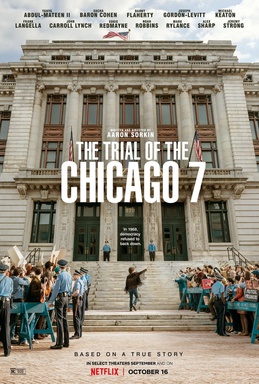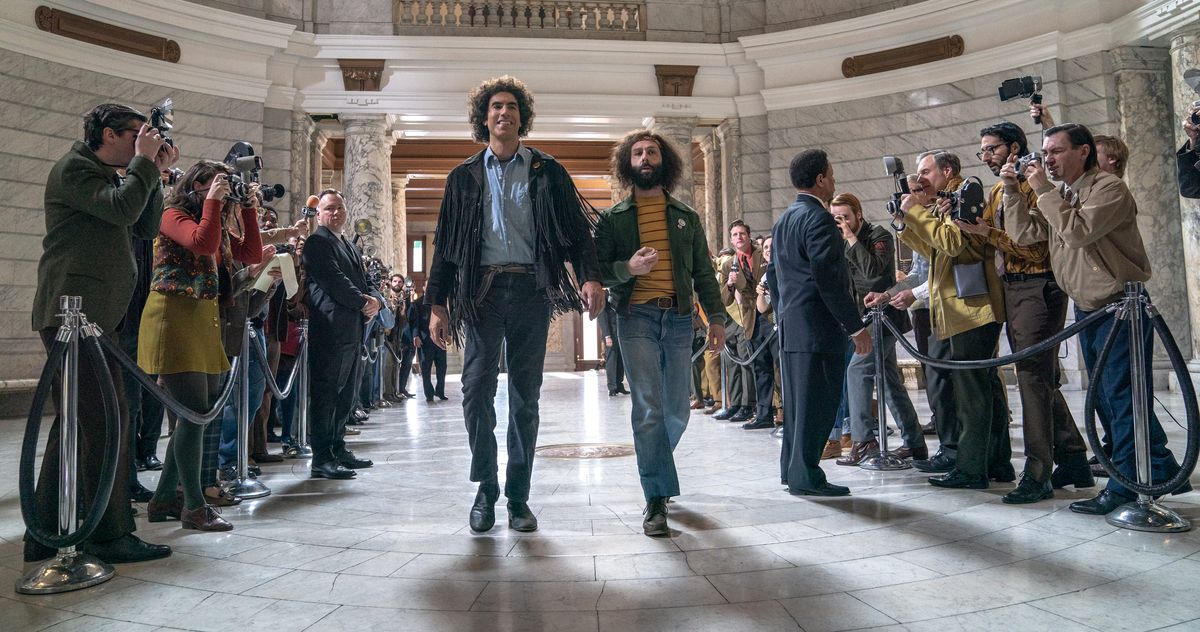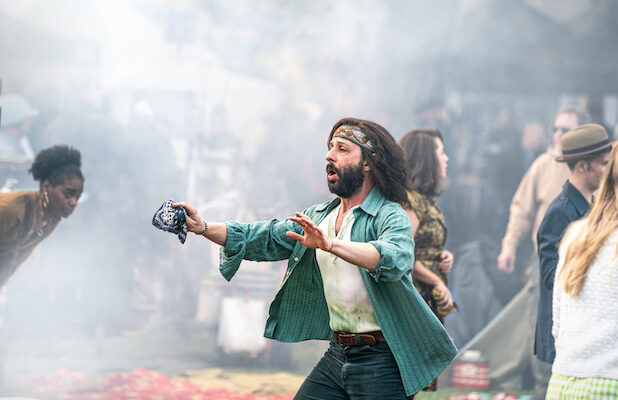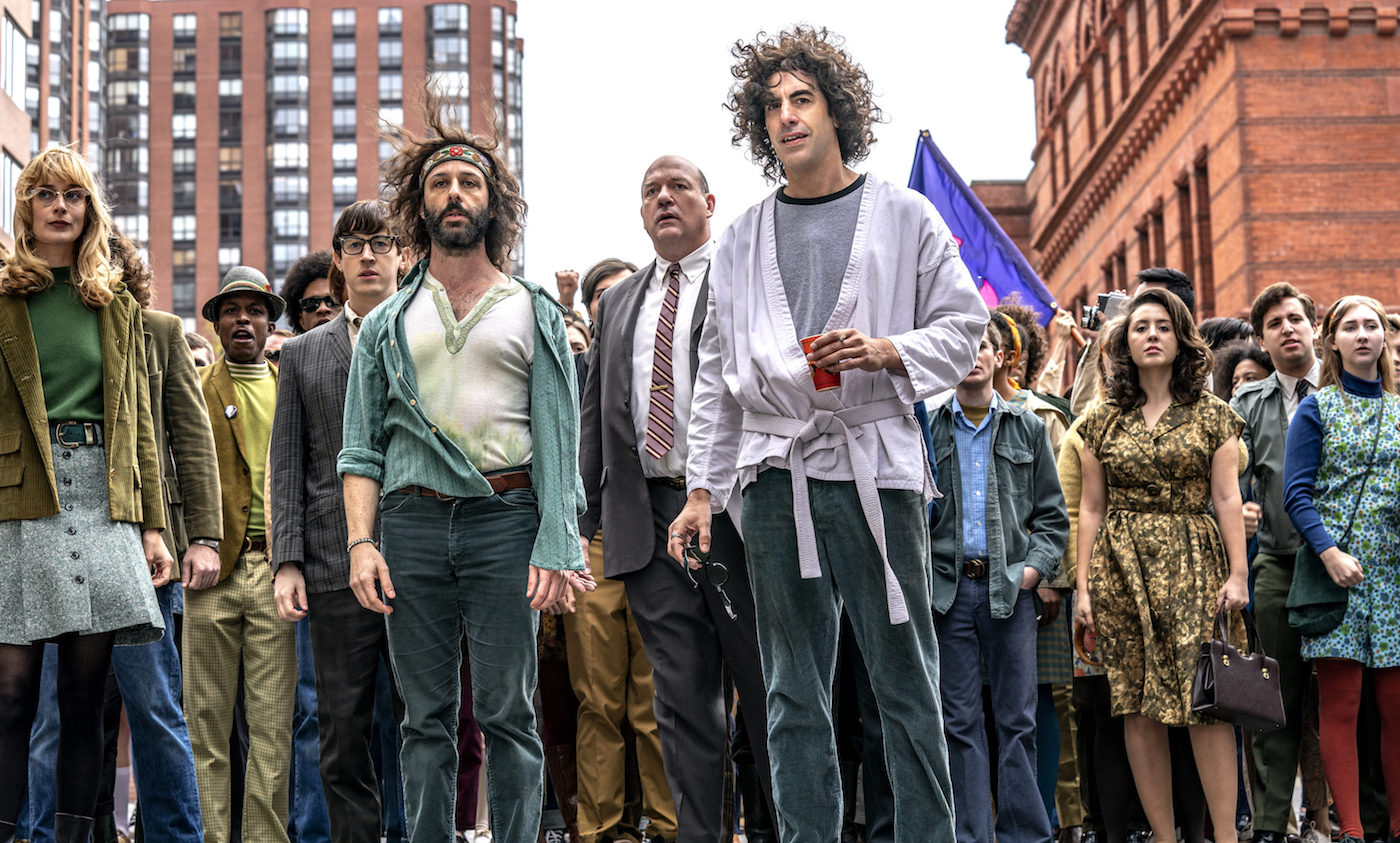← Back to Reviews
in
The Trial of the Chicago 7
A decade after winning his first Oscar for writing The Social Network, Aaron Sorkin is likely to come home with at least one more Oscar for directing and writing 2020's The Trial of the Chicago 7, a ferocious and unapologetic look at one of the most ugly and often unbelievable events in American history that completely mesmerized this reviewer, taking me through a myriad of emotions, and convincing me that this is the frontrunner for the Oscar for Best Picture of 2020.

I was only ten years old when the events of this film occurred but really didn't understand a lot of what happened and even after viewing this film, there is a lot I still don't understand, but what I did learn here incited a lot of anger and shame inside me. For those who weren't around, riots and demonstrations at the 1968 Democratic Convention, primarily serving as a protest to the Vietnam War. There was massive destruction of property, injuries, deaths, and, if memory serves, CBS correspondent Mike Wallace was seriously injured during the mayhem. Five months after the convention, eight men were brought to trial for inciting the conspiracy that led to this devastating series of events and it is this trial that serves as a blueprint for this film, which provides a look at exactly what happened in Chicago as well as a lot of the fallout.

For my money, Aaron Sorkin is a lock for the Original Screenplay Oscar for his meticulous crafting of a turbulent time in history, made only richer with the release of this film coming during this country's current political climate. The story begins as we meet Tom Hayden, Jerry Rubin, Abbie Hoffman, Rennie Davis, David Dellinger, John Froines, Lee Weiner, and Bobby Seale planning their individual pilgrimages to Chicago, as well as their varied intentions for doing so and then skipping straight to the trial, where these events find these virtual strangers at the same defense table as co-conspirators, despite the fact that some of them had never met and some weren't even present at the riots.

This film chronicles allegiances that are sharply divided on both sides of this monumental legal case. We learn that prosecuting attorney Richard Schulze was pretty much shoved into this and that the judge presiding over the case, Julius Hoffman, at least according to this screenplay, was dealing with some form of senility or dementia that made his handling of the trial a mockery and Jerry Rubin and Abbie Hoffman's mockery of the process, that just enflamed the judge. Above all this was the absurdity was the fact that Bobby Seale went into this trial with no legal representation and the judge didn't seem to care, despite reluctant assistance from counselor William Kunstler, who tried to have Seale's back without actually representing him, which I didn't understand at all.

Sorkin's directorial skills make their mark here too, with an effective blending of archival footage of the events along with his own recreation of the events, which are in-your-face disturbing and hard to discount, where Sorkin gets a strong Oscar-worthy assist from film editor Alan Baumgarten. Sorkin's skill of blending archival footage with the event of the film recalled Oliver Stone's JFK.

Sorkin's attention to serving this ugly story is greatly aided by some terrific casting that greatly added to the emotional impact of this story. Oscar winner Eddie Redmayne is the moral heart of the story as Tom Hayden with a solid assist from Oscar winner Mark Rylance as William Kunstler. There is also solid work from Yahya Abdul-Mateen II as Bobby Seale, Jeremy Strong as Jerry Rubin, a stylish and theatrical turn from Frank Langella as Judge Hoffman, and especially a show stopping performance from Sasha Baron Cohen as Abbie Hoffman that should earn him the Oscar for Best Supporting Actor. This film was a blazing experience that was a triumph for Aaron Sorkin that left me spent and wiping tears from my eyes.
A decade after winning his first Oscar for writing The Social Network, Aaron Sorkin is likely to come home with at least one more Oscar for directing and writing 2020's The Trial of the Chicago 7, a ferocious and unapologetic look at one of the most ugly and often unbelievable events in American history that completely mesmerized this reviewer, taking me through a myriad of emotions, and convincing me that this is the frontrunner for the Oscar for Best Picture of 2020.

I was only ten years old when the events of this film occurred but really didn't understand a lot of what happened and even after viewing this film, there is a lot I still don't understand, but what I did learn here incited a lot of anger and shame inside me. For those who weren't around, riots and demonstrations at the 1968 Democratic Convention, primarily serving as a protest to the Vietnam War. There was massive destruction of property, injuries, deaths, and, if memory serves, CBS correspondent Mike Wallace was seriously injured during the mayhem. Five months after the convention, eight men were brought to trial for inciting the conspiracy that led to this devastating series of events and it is this trial that serves as a blueprint for this film, which provides a look at exactly what happened in Chicago as well as a lot of the fallout.

For my money, Aaron Sorkin is a lock for the Original Screenplay Oscar for his meticulous crafting of a turbulent time in history, made only richer with the release of this film coming during this country's current political climate. The story begins as we meet Tom Hayden, Jerry Rubin, Abbie Hoffman, Rennie Davis, David Dellinger, John Froines, Lee Weiner, and Bobby Seale planning their individual pilgrimages to Chicago, as well as their varied intentions for doing so and then skipping straight to the trial, where these events find these virtual strangers at the same defense table as co-conspirators, despite the fact that some of them had never met and some weren't even present at the riots.

This film chronicles allegiances that are sharply divided on both sides of this monumental legal case. We learn that prosecuting attorney Richard Schulze was pretty much shoved into this and that the judge presiding over the case, Julius Hoffman, at least according to this screenplay, was dealing with some form of senility or dementia that made his handling of the trial a mockery and Jerry Rubin and Abbie Hoffman's mockery of the process, that just enflamed the judge. Above all this was the absurdity was the fact that Bobby Seale went into this trial with no legal representation and the judge didn't seem to care, despite reluctant assistance from counselor William Kunstler, who tried to have Seale's back without actually representing him, which I didn't understand at all.

Sorkin's directorial skills make their mark here too, with an effective blending of archival footage of the events along with his own recreation of the events, which are in-your-face disturbing and hard to discount, where Sorkin gets a strong Oscar-worthy assist from film editor Alan Baumgarten. Sorkin's skill of blending archival footage with the event of the film recalled Oliver Stone's JFK.

Sorkin's attention to serving this ugly story is greatly aided by some terrific casting that greatly added to the emotional impact of this story. Oscar winner Eddie Redmayne is the moral heart of the story as Tom Hayden with a solid assist from Oscar winner Mark Rylance as William Kunstler. There is also solid work from Yahya Abdul-Mateen II as Bobby Seale, Jeremy Strong as Jerry Rubin, a stylish and theatrical turn from Frank Langella as Judge Hoffman, and especially a show stopping performance from Sasha Baron Cohen as Abbie Hoffman that should earn him the Oscar for Best Supporting Actor. This film was a blazing experience that was a triumph for Aaron Sorkin that left me spent and wiping tears from my eyes.
